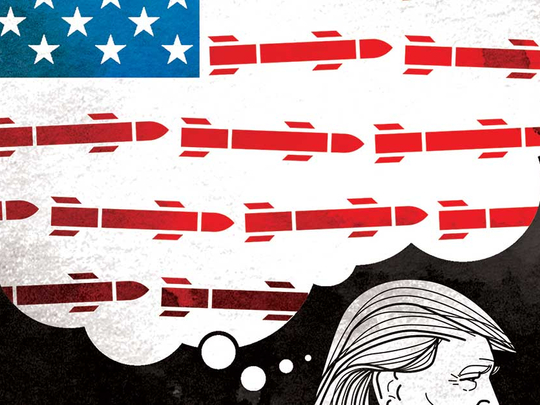
Americans did the incomprehensible when they elected the least qualified candidate in more than two centuries of their republic, and while the President-elect Donald Trump may turn out to be a fair president, chances are excellent that he will take the country to the brink. His cavalier tweet—for this will surely become the “tweetiest administration” ever—about the need for the US to further expand its nuclear capabilities, highlighted both immaturity as well as carelessness. What could possibly go wrong?
As leading observers concluded, Trump enjoys grandstanding and relies on social media to float stale ideas, instead of boning-up on serious matters. Time will determine whether his military advisors, presumably individuals he respects, will tame his propinquity for irrelevance. Their challenge will surely be to remove from the next president’s mind any notion that nuclear weapons are practical and ought to be used. It may fall on General James Mattis, the designated Secretary of Defence, to persuade Trump that advocating the additional expansion of the US nuclear weapons arsenal is not necessary.
In what was chilling reading, Trump recently wrote: “The United States must greatly strengthen and expand its nuclear capability until such time as the world comes to its senses regarding nukes,” which was not reassuring even if the tweet was a response to a speech delivered by Russian President Vladimir Putin. Reacting to what he perceives are provocative build-ups of Western forces along Russian borders, Putin told his officers: “We need to strengthen the military potential of strategic nuclear forces, especially with missile complexes that can reliably penetrate any existing and prospective missile defence systems.”
Irrespective of what Trump and Putin contemplate, the open discussion on nuclear weapons is both irresponsible and downright frightening. Of course, the two men are positioning themselves on the rapidly evolving political checkerboard, with Trump sending a clear warning to Putin that Russia remains a potential foe.
As far as it is known, the president-elect has yet to disavow a leading Pentagon assessment, which was adopted by the Obama Administration in its strategic blueprint, that Russia is the greatest threat to US national security. Both General Joseph Dunford, Chairman of the Joint Chiefs of Staff, and his predecessor, General Martin Dempsey, signed on to this valuation, which is not expected to change.
Yet, what illustrated Trump’s carelessness was his unrestrained calls, which raised two key questions: should he be handed the nuclear codes and should he be allowed to even contemplate the idea that he may have the power to set in motion the destruction of planet earth? These are not trivial questions because Trump bragged during the most bizarre presidential campaign in history that the use of nuclear weapons was fair to achieve undefined American goals.
On March 23, 2016, for example, he told Bloomberg News that he wanted Daesh (the self-proclaimed Islamic State of Iraq and the Levant) “to think maybe we would use them”. On March 30, he told MSNBC that he would be prepared to use nuclear weapons in the Middle East if the US was “hit” by Daesh. On March 31, he told Fox News that he would not “take off the table” ordering nuclear strikes in Europe — presumably against Russian targets — because it “is a big place”.
Keep the enemy in the dark
Remarkably, Trump routinely challenged real experts to explain why he can’t use nuclear weapons and, assuming that he was uttering a logical position, reserved the right to keep the enemy in the dark. “Frankly,” he said on MSNBC, “I don’t want the enemy to know how I’m thinking”.
One prays, yes prays, that Trump is truly thinking about these serious matters and that he will not play fast and loose with mankind. One also hopes that there will be no radical departure from current policy, which is dangerous enough—as it still focuses on the right to launch a nuclear first strike against states deemed to be in violation of the non-proliferation treaty — though the Mutual Assured Destruction doctrine mercifully deters everyone, including Putin, of contemplating victory through such exchanges.
Notwithstanding Trump’s provocative tweet, Putin’s recent reactions were specifically the result of a massive American overhaul of the US nuclear arsenal, though one hopes that the two men will clarify their intentions during their first head-to-head meeting. They should remind each other that the atomic bombs that fell on Hiroshima and Nagasaki towards the end of the Second World War were unilateral acts of power display, which can never be duplicated again given the concrete possibility of retaliation, and that both Washington and Moscow ought to sober up.
Dr Joseph Kechichian is the author of the forthcoming book The Attempt to Uproot Sunni Arab Influence: A Geo-Strategic Analysis of the Western, Israeli and Iranian Quest for Domination (Sussex: January 2017).









